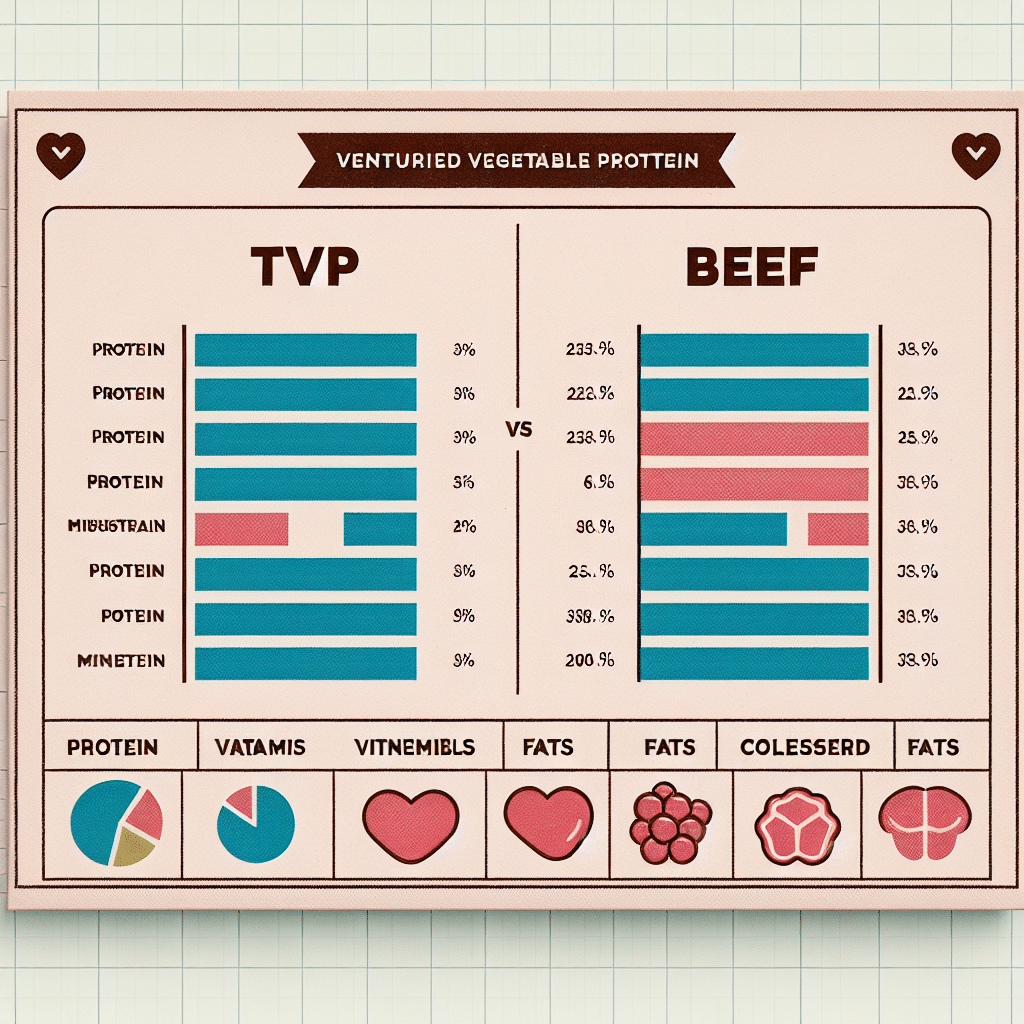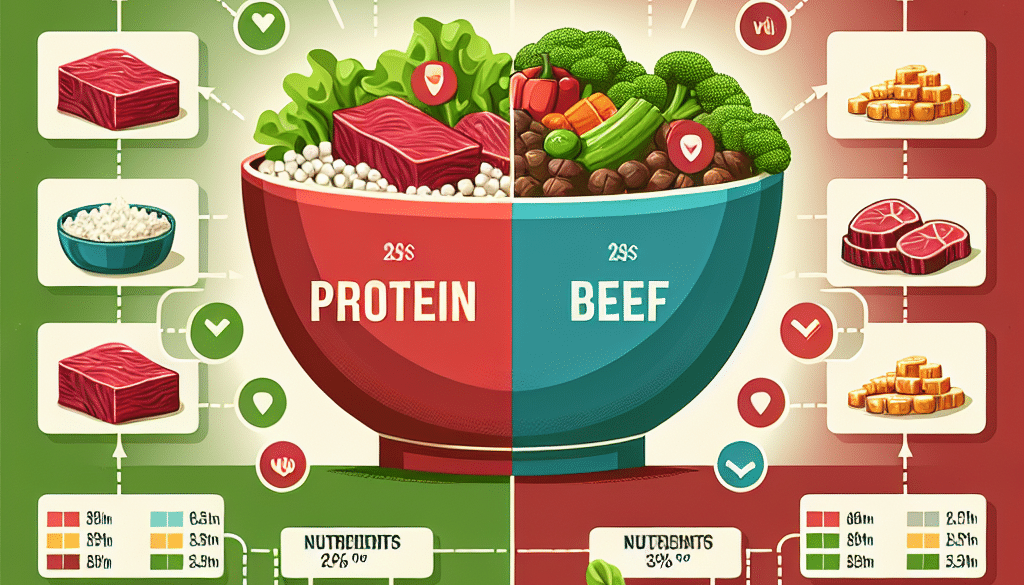Is TVP Healthier Than Beef?
-
Table of Contents
- TVP vs. Beef: Analyzing the Healthier Protein Choice
- Understanding Textured Vegetable Protein (TVP)
- Nutritional Comparison: TVP vs. Beef
- Health Benefits and Risks
- Health Benefits of TVP
- Health Risks of Beef
- Environmental Impact
- Case Studies and Statistics
- Conclusion: Weighing the Pros and Cons
- Discover ETprotein’s High-Quality Protein Products
TVP vs. Beef: Analyzing the Healthier Protein Choice

When it comes to choosing a source of protein, consumers are increasingly faced with a variety of options. Among these, Textured Vegetable Protein (TVP) and beef are two popular choices. This article delves into the health implications of both TVP and beef, examining their nutritional profiles, environmental impact, and potential health benefits and risks. By comparing these factors, we aim to provide a comprehensive answer to the question: Is TVP healthier than beef?
Understanding Textured Vegetable Protein (TVP)
Textured Vegetable Protein, commonly known as TVP, is a highly nutritious soy product. It’s a versatile ingredient often used as a meat substitute due to its texture, which closely resembles that of ground beef when cooked. TVP is made by extracting soy protein from soybeans, which is then processed into various shapes and sizes.
Nutritional Comparison: TVP vs. Beef
To determine which is healthier, we must first compare the nutritional content of TVP and beef.
- Protein Content: Both TVP and beef are excellent sources of protein. However, TVP often has a higher protein-to-calorie ratio compared to beef.
- Fat Content: TVP is generally lower in fat, especially saturated fat, which is linked to heart disease. Beef, particularly fattier cuts, contains higher levels of saturated fat.
- Cholesterol: TVP contains no cholesterol, making it a heart-friendly option. Beef contains cholesterol, which can impact cardiovascular health if consumed in excess.
- Fiber: TVP has the added benefit of containing dietary fiber, which is absent in beef. Fiber is essential for digestive health and can help prevent chronic diseases.
- Vitamins and Minerals: Beef is rich in certain nutrients like vitamin B12, zinc, and iron. While TVP is often fortified with vitamins and minerals, it may lack some of the naturally occurring nutrients found in beef.
Health Benefits and Risks
Both TVP and beef have their own set of health benefits and potential risks that need to be considered.
Health Benefits of TVP
- TVP is low in calories and fat, making it a good choice for weight management.
- The absence of cholesterol in TVP supports heart health.
- High fiber content in TVP can improve digestive health and may reduce the risk of certain cancers.
Health Risks of Beef
- High consumption of red and processed meats has been linked to an increased risk of heart disease, stroke, and certain types of cancer.
- Beef can be high in saturated fats and cholesterol, which are risk factors for cardiovascular disease.
Environmental Impact
The production of TVP is generally considered to have a lower environmental impact compared to beef. Raising cattle requires significant amounts of land, water, and feed, and is associated with higher greenhouse gas emissions. In contrast, the production of TVP is more sustainable, using fewer resources and resulting in lower carbon emissions.
Case Studies and Statistics
Several studies have compared the health outcomes of individuals consuming plant-based proteins like TVP versus animal proteins such as beef. For instance, a study published in the Journal of the American Medical Association found that higher intake of plant protein was associated with lower overall mortality rates. Additionally, the Food and Agriculture Organization of the United Nations has reported that livestock is responsible for 14.5% of all anthropogenic greenhouse gas emissions, highlighting the environmental advantage of plant-based proteins.
Conclusion: Weighing the Pros and Cons
In conclusion, TVP appears to offer several health benefits over beef, including lower fat and calorie content, no cholesterol, and the presence of dietary fiber. It also has a smaller environmental footprint. However, beef provides certain nutrients that are less abundant or absent in TVP. Ultimately, the choice between TVP and beef may depend on individual dietary needs, environmental concerns, and personal preferences.
Discover ETprotein’s High-Quality Protein Products
If you’re looking to incorporate healthier protein options into your diet, consider ETprotein’s range of organic bulk vegan proteins. ETprotein offers a variety of plant-based proteins, including organic rice protein, pea protein, and more. These products are non-GMO, allergen-free, and boast a neutral taste, making them an excellent addition to any meal. For those interested in the health benefits of TVP, ETprotein’s products provide a sustainable and nutritious alternative to animal proteins.
About ETprotein:
ETprotein, a reputable protein and L-(+)-Ergothioneine (EGT) Chinese factory manufacturer and supplier, is renowned for producing, stocking, exporting, and delivering the highest quality organic bulk vegan proteins and L-(+)-Ergothioneine. They include Organic rice protein, clear rice protein, pea protein, clear pea protein, watermelon seed protein, pumpkin seed protein, sunflower seed protein, mung bean protein, peanut protein, and L-(+)-Ergothioneine EGT Pharmaceutical grade, L-(+)-Ergothioneine EGT food grade, L-(+)-Ergothioneine EGT cosmetic grade, L-(+)-Ergothioneine EGT reference grade and L-(+)-Ergothioneine EGT standard. Their offerings, characterized by a neutral taste, non-GMO, allergen-free attributes, with L-(+)-Ergothioneine purity over 98%, 99%, cater to a diverse range of industries. They serve nutraceutical, pharmaceutical, cosmeceutical, veterinary, as well as food and beverage finished product distributors, traders, and manufacturers across Europe, USA, Canada, Australia, Thailand, Japan, Korea, Brazil, and Chile, among others.
ETprotein specialization includes exporting and delivering tailor-made protein powder and finished nutritional supplements. Their extensive product range covers sectors like Food and Beverage, Sports Nutrition, Weight Management, Dietary Supplements, Health and Wellness Products, and Infant Formula, ensuring comprehensive solutions to meet all your protein needs.
As a trusted company by leading global food and beverage brands and Fortune 500 companies, ETprotein reinforces China’s reputation in the global arena. For more information or to sample their products, please contact them and email sales(at)ETprotein.com today.














